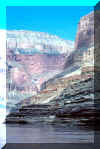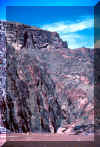|
This page contains photographs of landscapes in the Grand Canyon and
locations of samples.
 |
Overview of the central Grand Canyon, looking
northeast at Bright Angel Creek, with the Colorado River canyon in the
lower foreground. Zoroaster Temple is the prominent pointed butte in
the top right of the photograph. |
Exercise 9A - Mini-mysteries of the Grand Canyon
Each
photograph contains a geologic mystery, such as a dike, unconformity, or other
geologic feature. Begin by drawing a generalized sketch of each
photograph. Identify on your sketch the geologic mystery contained in the
photograph, and then solve the relative sequence of events that formed the scene
you observe. Click on the small image to bring up a larger version.

|
Precambrian rocks in the
bottom of the canyon at Hance Rapids, eastern Grand Canyon. The
lower red rock unit is siltstone and shale, and the upper rock is sandstone. There is also a dark-colored igneous rock. What
are the relative ages of these three rocks? |

|
Paleozoic rocks at
Stephen's Isle, central Grand Canyon. The bottom ledge is
Tapeats Sandstone, representing an ancient beach, overlain by
slope-forming Bright Angel Shale and Muav Limestone, with
cliff-forming Redwall Limestone (contains corals) at the top on the
right. All four formations contain marine fossils. What
changes in the environment could account for this sequence of rocks?
|

|
Inner Granite Gorge,
upstream from Phantom Ranch, central Grand Canyon. The lower
unit is dark Precambrian metamorphic rocks (Vishnu Schist) cut by
pinkish granite dikes; the upper unit is Cambrian Tapeats
Sandstone. What is the sequence of events represented here,
and what is the contact at the base of the sandstone? |
Exercise 9B - Sample Locations
|

|
Photograph showing sample
locations. View is
toward the southeast. |
|

